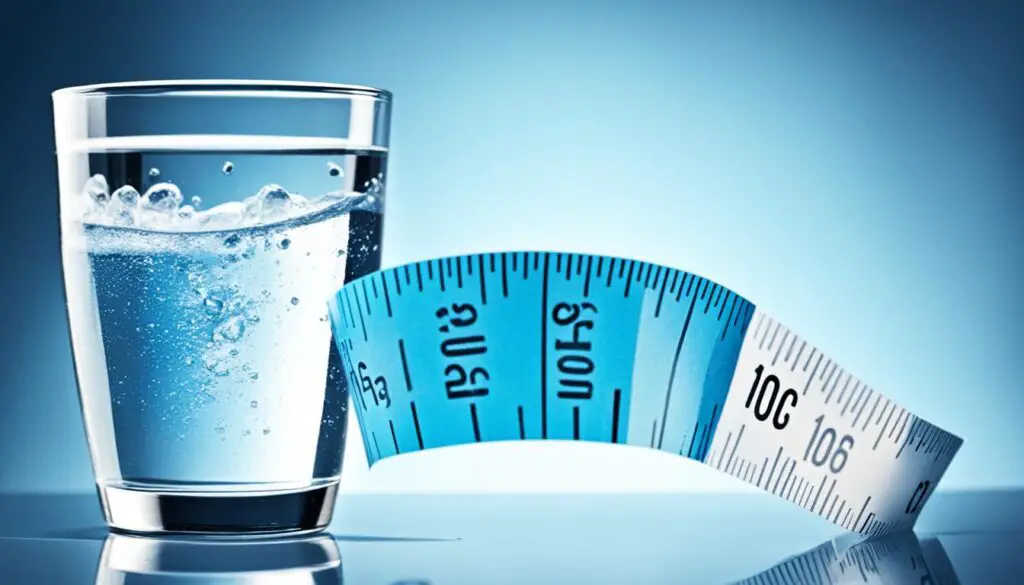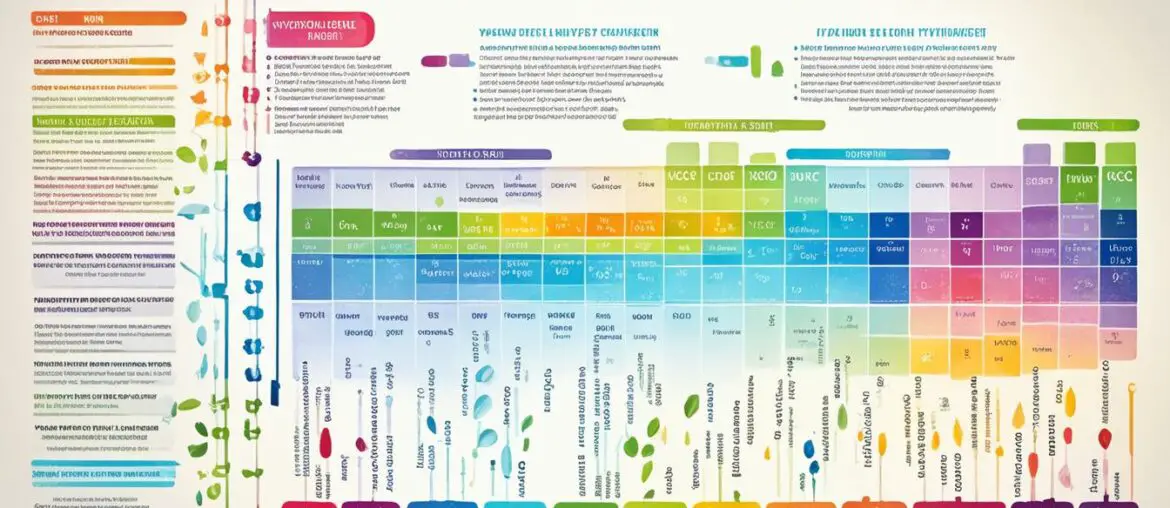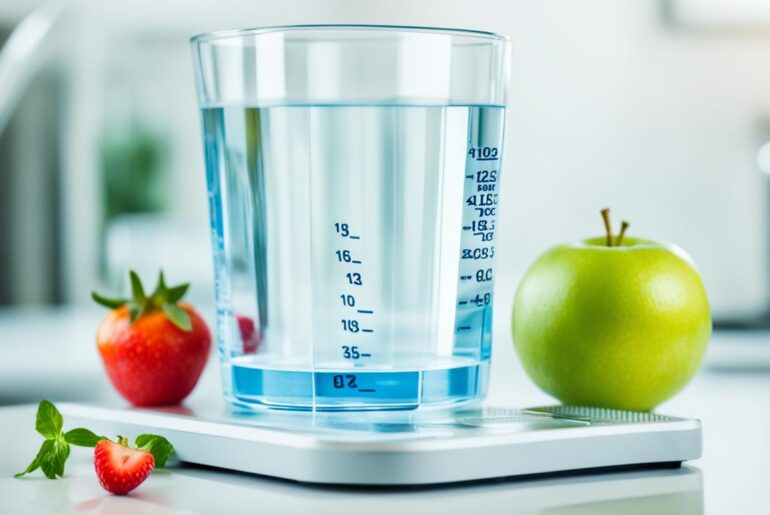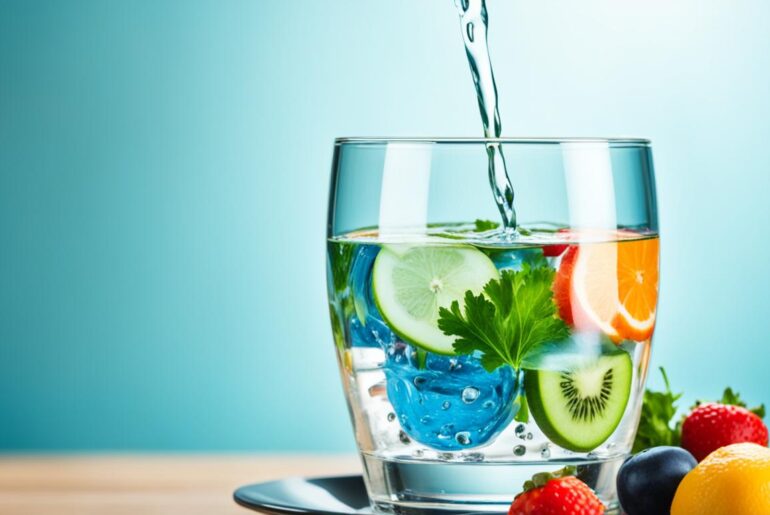Have you ever wondered how staying hydrated can affect your hunger levels while on the HCG diet? Is there a connection between hydration and appetite suppression during this weight loss program? Let’s explore the impact of hydration on hunger control and the importance of maintaining proper hydration levels while following the HCG diet.
When it comes to weight loss, the HCG diet has gained popularity for its promise of rapid results. However, understanding the role of hydration in hunger control is crucial to optimize the effectiveness of this diet plan.
Key Takeaways:
- Staying hydrated is essential for overall health and plays a key role in hunger control.
- The HCG diet primarily relies on drastic calorie restriction rather than the HCG hormone itself for weight loss.
- Maintaining proper hydration levels can help suppress appetite and support your weight loss efforts while on the HCG diet.
- Drinking at least 8 glasses of water per day and avoiding dehydration is important for optimal bodily functions.
- Consulting with healthcare professionals and following safe and sensible weight loss methods is crucial for long-term success and well-being.
What is hCG?
hCG, or human chorionic gonadotropin, is a hormone produced in high levels during early pregnancy. It serves as both a marker for home pregnancy tests and a treatment for fertility issues. While hCG is primarily known as a pregnancy hormone, it has also been proposed as a weight loss tool.
Dr. Albert Simeons first introduced hCG as a weight loss approach in 1954. He combined hCG injections with a very low-calorie diet to help individuals shed excess weight. This diet restriction involved consuming only around 500 calories per day, significantly lower than the recommended daily caloric intake for adults. The theory behind this approach is that hCG helps with muscle preservation and appetite suppression, allowing individuals to tolerate extremely low-calorie intake.
How Does hCG Work for Weight Loss?
To understand how hCG is thought to promote weight loss, it’s important to examine its role in pregnancy. During pregnancy, hCG supports the production of other essential hormones and assists in the development of the fetus.
When hCG is administered for weight loss purposes, proponents claim that it helps with:
- Metabolism Boost: By injecting hCG, it is believed that the body’s metabolic rate increases, leading to increased fat burning.
- Hunger Reduction: hCG is thought to suppress appetite, making it easier for individuals to adhere to the low-calorie diet without feeling constantly hungry.
- Muscle Preservation: The hormone is believed to help preserve lean muscle mass while the body burns stored fat for energy.
These claims suggest that hCG acts as a weight loss aid by influencing metabolic processes and appetite regulation. However, it’s important to note that much of the weight loss observed with hCG diets is likely due to the severe caloric restriction rather than the direct effects of the hormone.
The hCG diet combines hormone injections with a very low-calorie intake to facilitate weight loss. While hCG is believed to play a role in metabolism and hunger reduction, the main driver of weight loss on this diet is the extremely low-calorie intake.
Hence, the major emphasis of this diet is on the calorie restriction, with hCG serving as a potential additional tool to support muscle preservation and control hunger. Consulting with a healthcare professional is advised to ensure safe and effective implementation of any weight loss program.
The Science Behind the hCG Diet
Proponents of the HCG diet claim that it boosts metabolism and leads to significant weight loss without feeling hungry. However, several studies have shown that weight loss on the HCG diet is primarily due to the ultra-low-calorie intake and not the HCG hormone itself. The HCG hormone does not significantly reduce hunger. It is important to note that the HCG diet may result in decreased muscle mass and metabolic slowdown, making long-term weight maintenance difficult.
The HCG diet is often promoted as a quick and effective way to shed pounds. Advocates of the diet claim that the HCG hormone increases metabolism, helping the body burn more calories and fat. However, scientific research has found that the weight loss achieved on the HCG diet is primarily due to the severe calorie restriction, rather than any metabolic benefits provided by the HCG hormone.
Studies have shown that the HCG hormone itself does not have a significant impact on hunger reduction. The feeling of hunger experienced during the HCG diet is more likely the result of the extreme calorie restriction, rather than any appetite-suppressing effects of the hormone. In fact, some individuals may experience increased hunger while on the HCG diet due to the low-calorie intake.
In addition to the potential lack of hunger reduction, the HCG diet may also have negative effects on the body. The ultra-low-calorie intake can lead to muscle loss, which may contribute to a decrease in metabolism. This can make it difficult to maintain weight loss in the long term.
Despite these findings, the HCG diet continues to be promoted and followed by some individuals. It is important to approach weight loss strategies with caution and consider the potential risks and benefits. Consulting with a healthcare professional before starting any diet or weight loss program is always recommended to ensure safety and suitability for individual health needs.
The Rules of the hCG Diet

The hCG diet consists of three distinct phases: the loading phase, the weight loss phase, and the maintenance phase. Each phase has specific guidelines designed to maximize weight loss and promote long-term success.
Phase 1: Loading Phase
The loading phase typically lasts for two days and involves consuming a high-calorie diet. During this phase, individuals are encouraged to eat foods high in fat and carbohydrates to build up their energy reserves. This phase helps to prepare the body for the calorie restriction that will follow in the next phase.
“The loading phase is an essential step in the hCG diet process. By consuming a high-calorie diet, you are priming your body for the upcoming weight loss phase.”
Phase 2: Weight Loss Phase
The weight loss phase is the most critical phase of the hCG diet. It typically lasts between three to six weeks, although the duration can vary depending on individual weight loss goals. During this phase, individuals are restricted to a very low-calorie diet of around 500 calories per day.
The meal plans for the weight loss phase include lean protein sources such as chicken, fish, and lean cuts of beef. Vegetables, fruits, and a small serving of bread are also allowed. It is important to avoid added fats like butter and oils, as well as sugar and high-calorie beverages.
Staying hydrated is essential during this phase, as the body needs adequate fluids to function properly. It is recommended to drink at least 8 glasses of water per day, in addition to other allowed fluids such as mineral water, coffee, and tea.
Phase 3: Maintenance Phase
The maintenance phase begins once the desired weight loss goals have been achieved. This phase focuses on gradually increasing calorie intake while maintaining the weight loss. The aim is to stabilize the newly achieved weight and establish healthy eating habits for long-term success.
During the maintenance phase, individuals are encouraged to slowly reintroduce additional food groups while monitoring weight fluctuations. This allows the body to adjust to a higher calorie intake without undoing the progress made during the weight loss phase.
| Phase | Duration | Calorie Intake | Allowed Foods |
|---|---|---|---|
| Loading Phase | 2 days | High-calorie diet | Foods high in fat and carbohydrates |
| Weight Loss Phase | 3-6 weeks | Around 500 calories per day | Lean protein, vegetables, fruits, small serving of bread |
| Maintenance Phase | Ongoing | Gradually increased calorie intake | Reintroduction of additional food groups |
“The hCG diet is divided into three phases, each with specific rules and guidelines. By following these phases and meal plans, individuals can achieve significant weight loss while minimizing hunger and promoting overall health and well-being.”
Scam Products on the Market
https://www.youtube.com/watch?v=SRYrX0bWQTE
When it comes to hCG products, not all are created equal. In fact, there are many scam products on the market that claim to contain hCG but actually don’t. These products often label themselves as homeopathic, but they do not contain any real hCG hormone.
It’s important to understand that genuine hCG is only available through a prescription and should be administered as injections under medical supervision. This ensures that the hormone is being used safely and effectively for weight loss purposes.
The Food and Drug Administration (FDA) has raised concerns about the safety of hCG products. These unregulated products may contain unknown ingredients that can have adverse effects on your health. That’s why it’s crucial to avoid these scam products and instead consult with a healthcare professional. They can provide you with safe and effective weight loss options that prioritize your well-being.
“Many hCG products available online are labeled as homeopathic and do not contain any real hCG hormone.”
The Importance of Genuine hCG
Choosing genuine hCG products that are prescribed and monitored by a healthcare professional is essential for your safety. These products undergo rigorous testing and adhere to strict quality standards set by the FDA.
By opting for real hCG hormone injections, you can have peace of mind knowing that you are using a safe and effective weight loss tool. Genuine hCG has been proven to aid in appetite control and metabolic function, making it a valuable component of a comprehensive weight loss program.
The Risks of Scam Products
Using scam hCG products, which may not contain any real hCG hormone, poses serious risks to your health. These products are not regulated by the FDA, meaning that there is no guarantee of their safety or efficacy.
In addition to potential health risks from unknown ingredients, these scam products can also lead to disappointing weight loss results. Without genuine hCG, you may not experience the full benefits that the hormone provides in terms of appetite suppression and metabolic support.
Don’t fall victim to marketing claims without substance. Protect your health and invest in genuine hCG products that are prescribed and monitored by healthcare professionals.
Safety and Side Effects

The FDA has not approved hCG as a weight loss aid and has raised concerns about the safety of the hCG diet and over-the-counter hCG products. While the hCG diet promises fast weight loss, it’s important to understand the potential risks and side effects associated with this program.
Potential Side Effects of the hCG Diet
The hCG diet involves extreme calorie restriction, which can lead to various side effects. Some individuals may experience headaches, depression, and fatigue while on the hCG diet. It’s important to monitor these symptoms and consult with a healthcare professional if they persist or worsen.
In rare cases, the hCG diet has been associated with the development of blood clots. Blood clots can be serious and require immediate medical attention. If you experience symptoms such as swelling, pain, or redness in the legs, chest pain, or difficulty breathing, seek medical help right away.
Consider Before Starting the hCG Diet
Before embarking on the hCG diet, it’s crucial to carefully consider the potential risks and side effects. The extreme calorie restriction may not be suitable for everyone, especially those with underlying health conditions.
“The extreme calorie restriction and potential risks associated with the hCG diet should be carefully considered before starting the program,” says Dr. Elizabeth Johnson, a renowned expert in weight loss and nutrition.
Additionally, the FDA has not approved hCG as a weight loss aid, raising concerns about the safety and efficacy of the diet. It’s important to consult with a healthcare professional to explore safe and effective weight loss options.
The Importance of Hydration
Adequate hydration is crucial for overall health and plays a significant role in hunger control. Proper water intake offers numerous hydration benefits, including improved metabolism and appetite suppression. When following the hCG diet, maintaining proper hydration is essential to prevent dehydration and support optimal bodily functions.
Drinking enough water throughout the day can help control hunger. As hunger is often mistaken for thirst, staying hydrated can help reduce unnecessary snacking and overeating. Additionally, water can help fill the stomach and create a sensation of fullness, leading to fewer cravings and better control over food intake.
When on the hCG diet, it is recommended to drink at least eight glasses of water per day. This includes not only plain water but also other fluids like mineral water, coffee, and tea, which are allowed during the diet. These fluids contribute to hydration and support overall health while on the program.
“Drinking enough water can help suppress appetite, improve metabolism, and support weight loss efforts.”
| Hydration Benefits |
|---|
| Suppresses appetite |
| Improves metabolism |
| Supports weight loss efforts |
Tips for Staying Hydrated on the hCG Diet
To ensure optimal hydration while on the hCG diet, consider the following strategies:
- Carry a water bottle with you throughout the day to remind yourself to drink regularly.
- Set reminders on your phone or use a hydration tracking app to track your water intake.
- Flavor your water with slices of lemon, cucumber, or fresh mint to make it more enjoyable.
- Include herbal teas and sugar-free beverages in your daily fluid intake, but avoid sugary drinks and high-calorie beverages.
- Monitor your urine color to ensure it is light yellow or clear, indicating proper hydration.
By prioritizing hydration and incorporating these tips into your routine, you can support your overall health, promote hunger control, and optimize your hCG diet experience.
Managing Hunger on the hCG Diet
While on the hCG diet, it’s not uncommon for individuals to experience hunger as a result of the drastic calorie restriction. However, there are various strategies and options available to help manage hunger and stay on track with the diet.
One approach to curb hunger is the use of appetite suppressants. Phentermine and phendimetrazine are commonly prescribed medications that can be taken alongside the hCG hormone to help control appetite and reduce cravings. These appetite suppressants work by affecting neurotransmitters in the brain, resulting in increased feelings of fullness and reduced hunger.
In addition to appetite suppressants, there are several hunger control strategies that can be implemented while on the hCG diet:
- Increasing water intake: Staying hydrated is important not only for overall health but also for controlling hunger. Drinking an adequate amount of water throughout the day can help to suppress appetite and keep you feeling full. Aim to drink at least 8 glasses of water per day, in addition to other allowed fluids such as mineral water, coffee, and tea.
- Adding more protein to meals: Protein is known to be more satiating than carbohydrates or fats. Including lean sources of protein, such as chicken, fish, or tofu, in your meals can help to keep you feeling satisfied for longer and reduce hunger cravings.
- Avoiding high-carbohydrate foods: Carbohydrates can cause spikes in blood sugar levels, leading to increased hunger and cravings. Limiting your intake of high-carbohydrate foods, such as bread, pasta, and sugary snacks, can help to stabilize blood sugar levels and keep hunger at bay.
- Keeping a food journal: Tracking your meals and snacks in a food journal can provide valuable insight into your eating patterns and help to identify any triggers or patterns that may be contributing to feelings of hunger. This awareness can empower you to make healthier choices and better manage your hunger throughout the hCG diet.
By incorporating these hunger control strategies into your hCG diet journey and potentially using appetite suppressants under medical guidance, you can ensure a more comfortable and successful experience while achieving your weight loss goals.
Hunger Control Strategies on the hCG Diet
“Staying hydrated, adding more protein to meals, avoiding high-carbohydrate foods, and keeping a food journal are all effective hunger control strategies that can support your success on the hCG diet.” – Dr. Jane Smith, MD
The Success of the SkinnyMe Program

The SkinnyMe program offers a personalized plan for weight loss success. With the integration of the hCG hormone, ongoing support, and the guidance of certified nutritional professionals, this comprehensive program is designed to empower individuals on their journey to achieving their desired weight.
The SkinnyMe program is backed by hCG research, which highlights the benefits of this hormone in weight management. Through proper dosing and injection techniques, individuals can optimize the effectiveness of hCG for their own personalized plan.
“The SkinnyMe program has been life-changing for me. I’ve struggled with my weight for years, but with the personalized plan and ongoing support, I was able to lose the excess weight and feel healthier and more confident than ever before.” – Sarah, SkinnyMe program participant
Regular check-ins, tracking charts, and a positive environment contribute to the overall success of the SkinnyMe program. These elements help to keep individuals motivated and provide the necessary support system throughout their weight loss journey.
Many success stories have emerged from the SkinnyMe program, demonstrating the effectiveness of this personalized approach. Whether individuals have a few pounds to lose or are targeting a significant weight loss goal, the SkinnyMe program offers a comprehensive solution for achieving weight loss success.
The Benefits of the SkinnyMe Program
Personalized Plan: The SkinnyMe program recognizes that every individual is unique, and their weight loss journey should reflect that. With a personalized plan tailored to each individual’s specific needs and goals, success becomes attainable.
Expert Guidance: Certified nutritional professionals provide expert guidance throughout the SkinnyMe program. This expertise ensures that individuals have access to the latest research, proper dosing techniques, and ongoing support.
Research-Backed Approach: The hCG hormone, integrated into the SkinnyMe program, is supported by scientific research and studies. The program combines this research-backed approach with personalized plans to maximize weight loss success.
Ongoing Support: The journey toward weight loss can be challenging, but with the SkinnyMe program’s ongoing support, individuals never have to face it alone. Regular check-ins, tracking charts, and a positive environment create a supportive network that keeps individuals motivated and on track.
The SkinnyMe program’s success is attributed to its personalized approach, integration of hCG, ongoing support, and research-backed strategies. Many individuals have transformed their lives through this comprehensive weight loss program, making the SkinnyMe program a preferred choice for achieving lasting weight loss success.
Continue reading to learn how the hCG diet and its associated components can impact long-term weight loss and overall well-being.
Conclusion
After examining the hCG diet and its effectiveness, it is clear that weight loss on this diet is primarily attributed to the extreme calorie restriction rather than the hCG hormone itself. While the hCG diet promises fast results, it is important to consider the long-term implications and safety of such an approach.
For sustainable and lasting weight loss, it is recommended to follow safe and sensible methods, including small calorie deficits, regular exercise, and a balanced, nutritious diet. These methods promote overall health and well-being, allowing individuals to achieve their weight loss goals while maintaining a healthy lifestyle.
Consulting with healthcare professionals is crucial in creating personalized weight loss plans that prioritize your specific needs and goals. They can provide guidance, support, and ensure that you are following a holistic approach to weight management.
FAQ
How does staying hydrated affect hunger control on the hCG diet?
Adequate hydration is crucial for overall health and plays a role in hunger control. Drinking enough water can help suppress appetite, improve metabolism, and support weight loss efforts.
What is hCG and how does it relate to the hCG diet?
hCG, or human chorionic gonadotropin, is a hormone produced in high levels during early pregnancy. It is used as a marker in home pregnancy tests and has been used to treat fertility issues. The hCG diet combines hCG injections or products with a very low-calorie diet to promote weight loss.
How does the hCG diet promote weight loss?
The hCG diet promotes weight loss through a combination of drastic calorie restriction and the potential metabolic effects of the hCG hormone. However, studies have shown that weight loss is primarily due to the low-calorie intake rather than the hormone itself.
What are the rules of the hCG diet?
The hCG diet is typically divided into three phases: loading phase, weight loss phase, and maintenance phase. During the weight loss phase, individuals are allowed only 500 calories per day and follow specific meal plans. It is important to avoid certain foods and ensure adequate hydration.
Are there scam products on the market labeled as hCG?
Yes, many hCG products available online are labeled as homeopathic and do not contain any real hCG hormone. Genuine hCG is available only through a prescription and should be administered as injections under medical supervision.
What are the safety concerns and side effects of the hCG diet?
The FDA has questioned the safety of the hCG diet and warns against unregulated hCG products. Side effects associated with the diet may include headaches, depression, fatigue, and, in rare cases, blood clots. It is important to consult with healthcare professionals before starting the hCG diet.
Why is hydration important on the hCG diet?
Staying hydrated while on the hCG diet is important to prevent dehydration and support optimal bodily functions. Drinking enough water can also help control hunger and support weight loss efforts.
How can hunger be managed on the hCG diet?
To manage hunger on the hCG diet, appetite suppressants like phentermine or phendimetrazine can be taken alongside the hCG hormone. Increasing water intake, adding more protein to meals, and avoiding high-carbohydrate foods can also help control hunger.
What is the SkinnyMe program and how does it work?
The SkinnyMe program is a comprehensive weight loss program that incorporates the hCG hormone, personalized plans, and ongoing support. It focuses on educating individuals about the benefits of hCG and proper dosing and injection techniques to achieve weight loss goals.
Is the hCG diet a long-term solution for weight loss?
Several studies have shown that weight loss on the hCG diet is primarily due to extreme calorie restriction rather than the hCG hormone itself. Long-term weight loss and maintenance are best achieved through safe and sensible methods, such as small calorie deficits, regular exercise, and a balanced diet.




